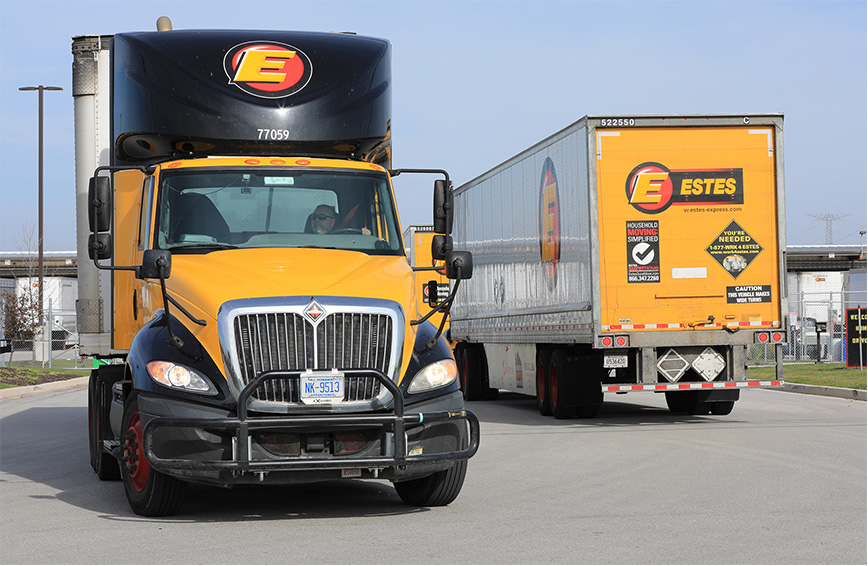No one enjoys tax season. Except for accountants and tax professionals. Luckily for truck drivers, a TMS has features that let you speed through tax preparation to get back on the road.
By providing accurate income and expense data, a TMS helps drivers make informed decisions about their business, such as whether to take on additional work or invest in new equipment. A TMS also helps drivers estimate their tax liability for the year and plan accordingly, reducing tax liability and making sure they're not caught off guard by unexpected tax bills.
Below are some examples of how a TMS helps truck drivers with tax preparation.
Self-employment taxes
Drivers classified as independent contractors or owner-operators are responsible for paying self-employment tax, which includes Social Security and Medicare taxes. Self-employment tax is a significant expense for truck drivers and can affect their bottom line. But by using a TMS, truck drivers can better manage their self-employment tax obligations.
Self-employment tax is calculated based on the net income earned by the driver, which is the total revenue earned minus any deductible expenses. A TMS automatically tracks all revenue earned from shipments and deliveries and any expenses related to those shipments, such as fuel, tolls, and maintenance costs.
The IRS requires self-employed individuals to pay estimated taxes quarterly based on their projected revenue for the year. Truck drivers can better gauge their self-employment tax liability for the year by having accurate income and expense data. When using a TMS to track income and expenses, drivers better understand their income and tax liability, helping them make more informed decisions about how much to pay in estimated taxes.
Having accurate income and expense data courtesy of software integrations and digital document management makes estimating self-employment tax liability easier.
Fuel taxes
The federal government requires all trucks operating on public highways to pay a tax on fuel, known as the Federal Excise Tax (FET), which is currently 24.4 cents per gallon for diesel fuel. State governments also require fuel taxes, which vary from state to state.
A TMS helps truck drivers with fuel taxes in several ways:
- Accurate fuel reporting: Automatically track and report fuel usage by integrating fuel card providers, GPS tracking, and other data sources. With accurate fuel reports, drivers know they're paying the correct fuel taxes and avoiding potential penalties for underreporting.
- Fuel tax calculation: Calculate fuel taxes for drivers based on the miles driven and the fuel used. Drivers avoid errors in estimating fuel taxes and know they're making proper payments.
- IFTA reporting: Automatically calculate and report the miles driven and the fuel used in each state or province. Truck drivers comply with state and federal regulations and IFTA reporting requirements.
- Fuel optimization: Optimize fuel usage with real-time information on fuel prices, traffic, and other factors affecting fuel consumption. Drivers then make informed decisions about their routes, speed, and other driving habits affecting fuel usage. By reducing fuel usage, drivers save money on fuel taxes and increase profitability. (And they can also see how to better combat rising fuel prices.)
- Cost allocation: Allocate fuel costs to specific shipments or customers. This is useful for billing purposes and tracking the profitability of different customers or shipments. Drivers know they're billing customers correctly and avoiding potential disputes.
Per diem and meal expenses
The IRS allows truck drivers to deduct per diem and meal expenses on their tax returns, subject to certain limitations.
Below are a few examples of how a TMS helps truckers with per diem and meal expenses:
- Automated expense tracking: Automatically track per diem and meal expenses based on driver data, including GPS data, fuel card data, and other sources, enabling drivers to properly track expenses while accurately reporting expenses.
- Real-time expense reporting: Get real-time reporting of per diem and meal expenses, allowing drivers to stay on top of their costs and adjust their spending as needed. Drivers avoid spending too much on lodging and meals to stay within their per diem allowance.
- Compliance with IRS regulations: The IRS has strict rules regarding deducting per diem and meal expenses. A TMS helps drivers comply with these regulations by providing detailed expense reports, including fuel receipts and other documentation that may be required by the IRS.
- Cost savings: Save money on per diem and meal expenses with real-time information on the best rates for lodging and meals. With this feature, drivers can choose the most best options and avoid unnecessary costs.
- Easy record-keeping: Simplify record-keeping for per diem and meal expenses by storing all the necessary data in one place, saving drivers time and effort in organizing and managing their expense records.
Get the TMS that takes the pain out of tax preparation
Tax season is a time most of us dread. But it comes around every year, whether we like it or not. So it makes sense to get software that can reduce the headache and assure you that you're paying your obligation and complying with regulations.




-2.jpg)